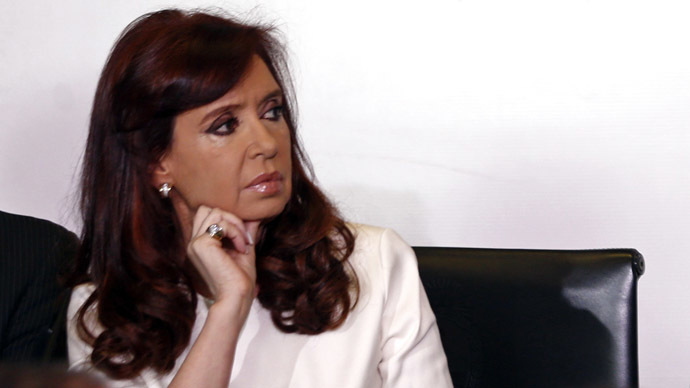Who is to blame for Argentina’s default?

At the end of last week credit rating agencies Fitch and S&P classified Argentina as a “selective default”.
As a consequence, the Argentine stock exchange MERVAL plummeted by 6 percent on Thursday. This is the eighth time that Argentina has defaulted on its debt.
Nearly thirteen years ago, it defaulted on $102 billion in debt. Mass demonstrations followed. Four presidents resigned. And economic collapse ensued in Latin America’s third largest economy. This time around the situation has been more subdued.
Since 2005 Argentina has been paying $0.30 cents on a dollar to its creditors as part of its debt restructuring plan. It is even paying back the IMF’s outstanding claim of $9.5 billion, a good student some would claim. For the last twelve years Argentina’s economy has performed reasonably well as Paul Krugman points out. But with a sluggish world economy, it is no surprise that a country dependent on the export of agriculture and raw materials, and import of gasoline, medicine and machines would slide into recession.
Kirchner’s economic policies are far from flawless but they are not to blame for the latest “default”. Cut off from the international financial and bond markets for twelve years now, the Kirchner government has sought to refinance its social programs and state investments by raiding its pension fund and printing more pesos. As a consequence, it has never been able to tackle inflation. Official estimates state that Argentines’ real incomes have decreased by six percent this year. Commentators and economic experts argue inflation amounts to an astonishing 40 percent. If one thing is certain, last week’s “default” will immiserate millions of Argentines – and a dysfunctional international legal and financial system are to blame.
“Kirchnerismo” to blame?
Following the “default” President Christina Kirchner was quick to portray herself as the victim of the “buitres”, the vultures, so to speak. And she has every reason to. Argentina is not broke. In fact, it holds $29 billion in currency reserves. Kirchner simply does not want to bend to the will of unscrupulous and unrelenting US hedge funds which can rely on US courts and the press for unconditional backing.
Ever since Christina Kirchner took over from her late-husband, American and international journalists have accused her of cooking the books and siphoning off money to hide it from honest creditors. The German magazine Der Spiegel argues that she has refused to negotiate with private creditors. Nothing could be further from the truth.
Argentina willingly pays its bondholders. On two separate occasions in 2005 and 2010 they have agreed to the plans. However holdout investors such as NML Capital which bought $50 million of Argentine distressed debt on the secondary markets are eyeing for super-profits of 1600 percent. I repeat 1600 percent! In collusion with New York judge Michael Griesa who ruled in favor of blocking further payments to creditors at the current rate of $0.30 on a dollar, these investors are now owed 1.3 billion dollars by the Argentinean state. This is money which was never lent to Argentina in the first place.

The power of the hedge funds
The Argentinean case highlights a strategic shift on behalf of creditors. Traditionally, states and their companies pursued a strategy of sanctions and excluding highly indebted countries from capital markets. Today, hedge funds use judicial and legal loopholes to rake in even bigger profits.
According to John Pottow of Michigan Law School, hedge funds like NML Capital use the private mechanism of litigation to collect on defaulted sovereign debt. Billionaire Peter Singer has made a comfortable living by chasing debt around the world from Peru to Congo. Elliot Management, parent to NML Capital beats the market every year as it averages 14 percent returns. Argentina is just the latest prey on his list.
Singer, the repo-man, has sought to impound Argentine assets worldwide. He has successfully held the war ship “Libertad” for two months in Ghana and even Kirchner’s presidential plane. Meanwhile, Singer attempted to seize Argentine’s diplomatic funds in Belgium and even dinosaur skeletons in Bavaria. So far there is no international legislation to limit hedge fund recoveries against sovereign debtors.
This has two inter-related implications. Firstly, hedge funds command legal rights equivalent to those of a nation-state. Secondly, it is impossible to restructure a nation-state’s debt. As a consequence, sovereign immunity is at stake. Companies and individual citizens can go bankrupt and restructure their debt, but nation-states cannot. It is not the case that international law has failed but much rather that it acts in hedge funds’ interests above anything else.
What kind of compromise?
Under pari passu, a country needs to treat all bondholders the same. The RUFO clause (‘Rights Upon Future Offers’) in Griesa’s ruling entitles all bondholders to a better deal if Argentina offers a better deal to one of its bondholders by the end of the year.
It is a race against the time. To compromise now would only lead to other hedge funds and vultures coming to look for more. It could lead to possible claims of up to $500 billion, equivalent to the country’s yearly GDP, and indebt Argentina once and for all. But it is also a fight against the indebted servitudes to US hedge funds.
Sooner or later, Kirchner will have to settle. She ought to settle though on Argentina’s own terms. The fact that Argentina has been cut off from international financial, bond and capital markets now can strengthen its position and alleviate some of the pressure. The question is for how long. Singer and co. have gone to great lengths to display their strength. It is unlikely that they will give up anytime soon. Kirchner’s only hope is el pueblo, the people. They refused to foot the bill in 2001 and they will refuse again.
The statements, views and opinions expressed in this column are solely those of the author and do not necessarily represent those of RT.
The statements, views and opinions expressed in this column are solely those of the author and do not necessarily represent those of RT.













